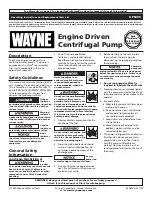
4. MAINTENANcE
4.1.
cLEANING
Keep the outer case of the wrench clean.
DO NOT
wash with water or
use solvents or abrasives. Use a damp cloth.
4.2.
carbon Brushes
If the wrench performance starts to degrade over a long period of time,
check the brushes. When new the brush length is 11mm, if
they are less than 4mm the carbon brushes require replacement.
4.2.1. To replace brushes, unscrew the brush cap (Fig. 3) extract the old
brush (Fig. 4). Replace with a new one (Fig. 5).
4.2.2. Repeat the process on the other side.
Note! Always replace brushes as a pair. Part No. CP3003.28
For any other service or maintenance, contact your authorised service
agent.
Fig. 3
Fig. 4
Fig. 5
NOTE:
It is our policy to continually improve products and as such we reserve the right to alter data, specifications and component parts without prior notice.
IMPORTANT:
No liability is accepted for incorrect use of this product.
WARRANTY:
Guarantee is 12 months from purchase date, proof of which will be required for any claim.
INFORMATION:
For a copy of our latest catalogue and promotions call us on 01284 757525 and leave your full name and address, including postcode.
01284 757500
01284 703534
Sole uK Distributor, Sealey Group,
Kempson Way, Suffolk Business Park
,
Bury St. Edmunds, Suffolk,
IP32 7AR
www.sealey.co.uk
Web
Original Language Version
Risk of hand Arm Vibration Injury
Cordless Impact Wrench Model No. CP3003.V2 when operated in accordance with these instructions and tested in accordance with
BS EN 28662-1:1993, ISo 8662-1:1988 and BS EN ISo 28927-2:2009 results in the following vibration emission declared in accordance
with BS EN 12096:1996.
Measured vibration emission value:
12.27m/s²
uncertainty:
4.91m/s²
These values are suitable for comparison with emission levels of other tools that have been subject to the same test.
This tool may cause hand-arm vibration syndrome if its use is inadequately managed.
Recommended Measures to reduce risk of hand-arm vibration syndrome:
This tool should not be used by an individual regularly for more than 40.67 minute
s in any 8 hour period.
This duration of use should be reduced if the individual is exposed to hand-arm vibration from other sources.
CP3003.V2 Issue: 2 - 04/01/12
3.3.
uSING ThE WRENch
3.3.1. Use only impact sockets which are specifically designed for use with an impact wrench. The use of normal chrome vanadium sockets
is dangerous since these are more brittle and are liable to shatter.
3.3.2. Fit the socket to the wrench by snapping it onto the square drive.
3.3.3. Fit the battery pack to the wrench.
3.3.4. Select the required direction of rotation. To change direction, push Forward/Reverse button (Fig. 1) to the left or right. Familiarise
yourself with this operation before use.
DO NOT
attempt to change the direction of rotation whilst trigger is depressed. When the
wrench is not in use, use the Forward/Reverse button to lock off the trigger by placing the switch in the middle position.
3.3.5. When tightening, release the trigger as soon as the impact sound is heard. Take care not to over-torque small fixings.
Note: On critical fixings always check the torque with a torque wrench according to the vehicle manufacturer’s or product
guidelines.





















